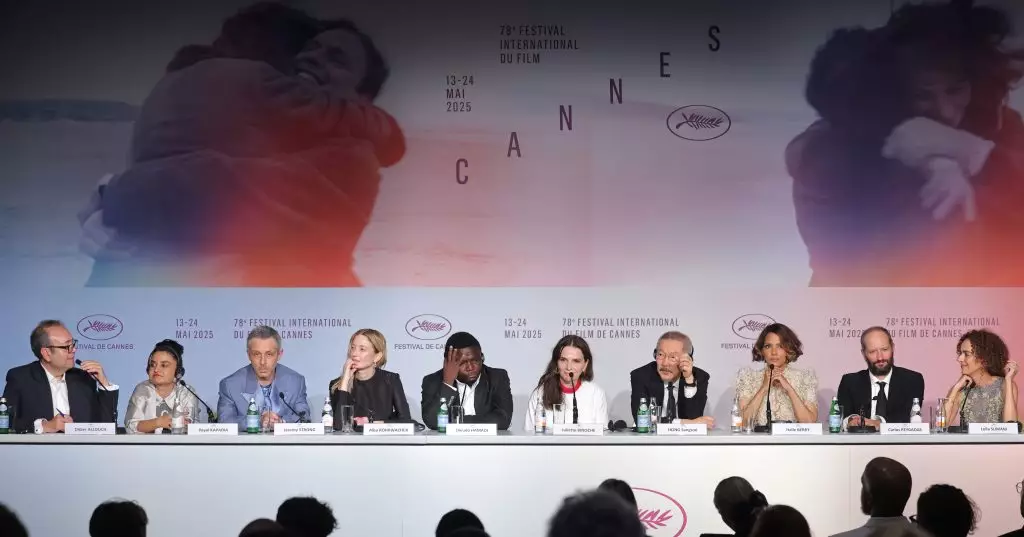In a moment that left film aficionados abuzz with surprise, Jafar Panahi’s ‘It Was Just an Accident’ clinched the prestigious Palme d’Or at the Cannes Film Festival. This result was not merely a nod to artistry; it was a decisive acknowledgment of the resilience and resistance that Panahi embodies through his work. Jury President Juliette Binoche articulated the sentiment perfectly, equating the film to a lifeline in a world fraught with tension and anguish. She underscored the dual nature of the film as both profoundly human and strikingly political, aspects that resonate with viewers who are acutely aware of the complexities surrounding Panahi’s own tumultuous life in Iran.
Panahi’s road to this moment has been anything but smooth. Before his 2023 release from an unjust imprisonment, Panahi faced significant obstacles that have shaped not only his films but also his very identity as an artist. This recent win at Cannes serves as both an artistic and moral statement, an invitation for viewers to engage with the realities of courage and advocacy within storytelling.
A Review of the Filmmaker’s Evolution
Panahi’s cinematic journey is rich and layered, marked by accolades as well as adversity. He won the Camera d’Or for his debut film, ‘The White Balloon,’ in 1995 and continued to impress with works such as ‘3 Faces’ and ‘Crimson Gold,’ the latter fetching him a Jury Prize in Un Certain Regard in 2003. These achievements underscore not only his talent but also his commitment to storytelling that challenges viewers to confront uncomfortable truths about society.
Vicissitudes of life have infused his narratives with authenticity. In ‘It Was Just an Accident,’ we see a portrayal of the working class battling oppression and seeking justice after wrongful accusations, mirroring Panahi’s own struggles. The film poignantly addresses themes of revenge and rehabilitation, imbuing the narrative with a spectrum of emotional depth. Binoche, herself an icon of the cinematic world, emphasized the film’s vital relevance in today’s climate, where voices demanding change seem more critical than ever.
Bridging Art and Activism
Binoche’s reflections extend beyond typical critiques, merging art with the urgent call for social transformation. “Art will always win,” she insists, placing a spotlight on the responsibilities artists carry in modern society. The film offers a lens through which to analyze the cycles of violence and the human capacity for empathy and forgiveness. Rather than perpetuating hatred, Panahi’s work invites audiences to consider the transformative power of compassion—an ideal that seems, in many ways, radical yet paramount.
The underlying message of ‘It Was Just an Accident’ is a refreshing reminder that art has the power to transcend its medium and prompt societal introspection. It’s an assertion that in a world rife with division and aggression, the ability to listen and evolve holds immense potential. When one considers the remarkable context of Panahi’s own life, the story becomes not just a narrative but a profound statement on humanity itself.
The Power of Collective Voices at Cannes
The Cannes jury’s camaraderie and their collaborative decision-making process offers an additional layer of insight into the festivity’s significance. Actor Brian Strong’s humorous comparison of their deliberation to a “conclave with champagne” deftly illustrates the gravity intertwined with creativity, suggesting that the symposium of diverse voices brings forth a richness in the evaluation of films. By joyfully acknowledging the serious undercurrents at play, the participants highlighted an artistic ethos that values both beauty and intellect.
The choice of ‘It Was Just an Accident’ as the Palme d’Or winner symbolizes a collective stand against apathy. By recognizing films that transcend mere entertainment, the jury reinforces the role of art as a beacon in challenging times. The collective admiration for Panahi’s work embodies the very ideals that cinema must strive for—a dynamic dialogue that not only critiques but uplifts and transforms perceptions.
In essence, the triumph of Jafar Panahi at Cannes is far more than an award; it is a resounding affirmation of the role of cinema in advocating for change, a reminder to connect through art, and a rallying cry to cultivate compassion in a world desperately in need of it.

